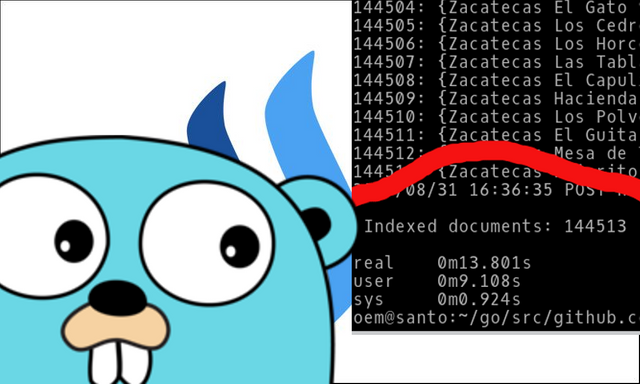
In this post im going to show you how to load 144513 documents in ElasticSearch Server in a few seconds.
For this example i used the Elasticsearch client for Go:
https://olivere.github.io/elastic/
and the BulkIndex:
https://github.com/olivere/elastic/wiki/BulkIndex
The BulkIndex help us to perform a many index operations in a sigle request.
Let's start
I will use the MX.zip (MX.txt csv file) file from the Geonames site.
To read the file I will use the package: encoding/csv
In this post I explain how to read a file in csv format, a part of that example I'm going to use for this new example.
A line in the MX.txt file looks like this:
MX 20010 San Cayetano Aguascalientes AGU Aguascalientes 001 Aguascalientes 01 21.9644 -102.3192 1
A part of these data I need to put in a structure, that structure is as follows:
type (
Document struct {
Ciudad string `json:"ciudad"`
Colonia string `json:"colonia"`
Cp string `json:"cp"`
Delegacion string `json:"delegacion"`
Location `json:"location"`
}
Location struct {
Lat float64 `json:"lat"`
Lon float64 `json:"lon"`
}
)
With the init function I'm going to create a new cliet like this:
func init() {
var err error
client, err = elastic.NewClient(
elastic.SetURL(os.Getenv("ELASTICSEARCH_ENTRYPOINT")),
elastic.SetBasicAuth(os.Getenv("ELASTICSEARCH_USERNAME"), os.Getenv("ELASTICSEARCH_PASSWORD")),
elastic.SetErrorLog(log.New(os.Stderr, "ELASTIC ", log.LstdFlags)),
elastic.SetInfoLog(log.New(os.Stdout, "", log.LstdFlags)),
)
printError(err)
}
In the next code, i load the cols of the csv file in the Document struct:
document := Document{
Ciudad: col[3],
Colonia: col[2],
Cp: col[1],
Delegacion: col[5],
Location: Location{
Lat: lat,
Lon: lon,
},
}
An this is the important part:
req := elastic.NewBulkIndexRequest().Index(os.Getenv("ELASTICSEARCH_INDEX")).Type(os.Getenv("ELASTICSEARCH_TYPE")).Id(id).Doc(document)
bulkRequest = bulkRequest.Add(req)
fmt.Printf("%v: %v\n", n, document)
This is where the Bulk request is created.
And finally the bulk request is executed as follows:
bulkResponse, err := bulkRequest.Do(ctx)
The complete version of the code is:
/*
twitter@hector_gool
https://github.com/olivere/elastic/wiki/BulkIndex
*/
package main
import (
"fmt"
elastic "gopkg.in/olivere/elastic.v5"
"encoding/csv"
"github.com/satori/go.uuid"
"context"
"os"
"log"
"strconv"
)
type (
Document struct {
Ciudad string `json:"ciudad"`
Colonia string `json:"colonia"`
Cp string `json:"cp"`
Delegacion string `json:"delegacion"`
Location `json:"location"`
}
Location struct {
Lat float64 `json:"lat"`
Lon float64 `json:"lon"`
}
)
const (
FILE ="./MX.txt"
TOTAL_ROWS = 1000000
)
var (
client *elastic.Client
)
func init() {
var err error
client, err = elastic.NewClient(
elastic.SetURL(os.Getenv("ELASTICSEARCH_ENTRYPOINT")),
elastic.SetBasicAuth(os.Getenv("ELASTICSEARCH_USERNAME"), os.Getenv("ELASTICSEARCH_PASSWORD")),
elastic.SetErrorLog(log.New(os.Stderr, "ELASTIC ", log.LstdFlags)),
elastic.SetInfoLog(log.New(os.Stdout, "", log.LstdFlags)),
)
printError(err)
}
func main() {
ctx := context.Background()
file, err := os.Open(FILE)
printError(err)
defer file.Close()
reader := csv.NewReader(file)
reader.Comma = '\t'
rows, err := reader.ReadAll()
printError(err)
bulkRequest := client.Bulk()
for n, col := range rows {
n++
id := uuid.NewV4().String()
if n <= TOTAL_ROWS {
lat, err := strconv.ParseFloat(col[9], 64)
printError(err)
lon, err := strconv.ParseFloat(col[10], 64)
printError(err)
document := Document{
Ciudad: col[3],
Colonia: col[2],
Cp: col[1],
Delegacion: col[5],
Location: Location{
Lat: lat,
Lon: lon,
},
}
req := elastic.NewBulkIndexRequest().Index(os.Getenv("ELASTICSEARCH_INDEX")).Type(os.Getenv("ELASTICSEARCH_TYPE")).Id(id).Doc(document)
bulkRequest = bulkRequest.Add(req)
fmt.Printf("%v: %v\n", n, document)
}
}
bulkResponse, err := bulkRequest.Do(ctx)
printError(err)
indexed := bulkResponse.Indexed()
if len(indexed) != 1 {
fmt.Printf("\n Indexed documents: %v \n", len(indexed))
}
}
func printError(err error) {
if err != nil {
fmt.Fprintf(os.Stderr, "Fatal error: %s", err.Error())
os.Exit(1)
}
}
To have an approximate runtime use the following instruction:
time go run elasticserach_bulk.go
And I get the following result:
Indexed documents: 144513
real 0m13.801s
user 0m9.108s
sys 0m0.924s
Conclusion:
I have to confess that the first solution that I thought was to generate 144513 curl commands like this:
curl -u elastic:changeme -X PUT "http://localhost:9200/mx/postal_code/1" -d "
{
\"cp\" : 20000,
\"colonia\" : \"Zona Centro\",
\"ciudad\" : \"Aguascalientes\",
\"delegacion\" : \"Aguascalientes\",
\"location\": {
\"lat\": 21.8734,
\"lon\": -102.2806
}
}"
And it worked but it took little more than 3 hours to load the 144513 registers
But with the example that shows them only takes on average 13 seconds! :)
What do you think?
Downvoting a post can decrease pending rewards and make it less visible. Common reasons:
Submit
je je
Downvoting a post can decrease pending rewards and make it less visible. Common reasons:
Submit
Congratulations @elsanto! You have completed some achievement on Steemit and have been rewarded with new badge(s) :
Click on any badge to view your own Board of Honor on SteemitBoard.
For more information about SteemitBoard, click here
If you no longer want to receive notifications, reply to this comment with the word
STOPDownvoting a post can decrease pending rewards and make it less visible. Common reasons:
Submit